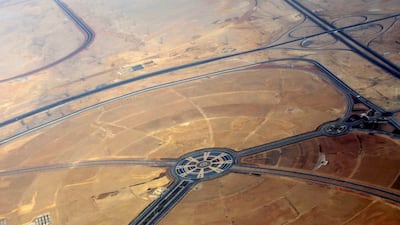The foreign ministers of Egypt and Jordan joined a senior Palestinian Authority official for a meeting to revive the peace process between the Palestinians and Israel.
Egypt’s foreign ministry said Jordanian, Egyptian and Palestinian intelligence chiefs also took part in the talks, which were held in Cairo on Monday.
It said their discussion touched on efforts to strengthen the truce Cairo brokered in May to end an 11-day war between Israel and Hamas, and reconstruction plans for Gaza.
The meeting “looked into a number of proposals to break the deadlock currently experienced by the peace process”, the foreign ministry said.
Also discussed was ways to identify a “political space” in which to bring about peace between the Israelis and the Palestinians, based on a two-state solution with east Jerusalem as the capital of a future Palestinian state.
Participants in the talks included Egyptian Foreign Minister Sameh Shoukry, Jordanian Foreign Affairs Minister Ayman Safadi and Hussein Al-Sheikh, head of the General Authority of Civil Affairs of the Palestinian Authority.
Direct negotiations between Israel and the Palestinians collapsed in 2014.
Monday’s meeting follows a visit to Cairo earlier this month by Israeli Foreign Minister Yair Lapid.
He and Egyptian President Abdel Fatah El Sisi discussed a long-awaited prisoner exchange between Israel and Hamas, the militant Palestinian group that has ruled Gaza since 2007.
In September, Mr El Sisi met Jordan’s King Abdulla and Palestinian President Mahmoud Abbas in Cairo to discuss ways to resume peace talks with Israel.
The same month, Mr El Sisi held talks with Israeli Prime Minister Naftali Bennett in the Egyptian Red Sea resort of Sharm El Sheikh.
Egypt, which signed a peace treaty with Israel in 1979, is mediating the proposed prisoner exchange between Israel and Hamas. The conclusion of the deal, according to Egyptian security officials, would be a key component of a broader deal to create a climate conducive to the resumption of Palestinian-Israeli peace negotiations on a final settlement of their conflict.
The broader deal, the officials said, include substantial investment to improve the economy of the Gaza Strip and its estimated 2.1 million residents, exploiting natural gas reserves off Gaza’s Mediterranean coast and giving Jordan a bigger and more authoritative role as the traditional custodian of Muslim holy shrines in Jerusalem and the West Bank.
Another track that the Egyptians have been working on is to close the rift between Hamas and Mr Abbas’ Ramallah-based Palestinian Authority. That schism dates back to 2007 when Hamas militants violently seized power in Gaza, breaking off ties with Ramallah.
Cairo is also working on persuading Palestinian factions to hold much-delayed presidential and legislative elections so that the winners have a valid popular mandate to negotiate a final settlement with Israel, said the officials.
According to Israeli media reports, Hamas is holding two Israeli civilians – Avner Mengistu and Hisham Al Sayed. It also has the bodies of two Israeli soldiers, Oron Shaul and Hadar Goldin, who were killed in the 2014 war.
Hamas wants Israel to release more than 1,100 prisoners in exchange. Israel, Egyptian security officials say, wants to release the Palestinian prisoners in batches, starting with older inmates, women and minors.
Hamas leaders have been indirectly negotiating the deal with Israel, with officials from Egypt’s General Directorate of Intelligence, the country’s top spy agency, acting as go-betweens.
Egyptian intelligence officials have traditionally taken the lead in dealing with Israel and the Palestinians. Israel does not directly negotiate with Hamas, which it considers a terrorist group.
Egypt has traditionally played a mediating role in the Arab-Israeli conflict alongside the US. Its role has been made possible, and credible, by its own US-sponsored peace treaty with Israel.












